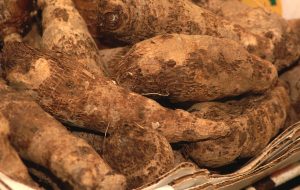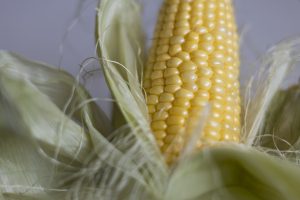When you’re giving thanks this Thanksgiving, consider that much of your food grew in the Sunshine State, say University of Florida experts.
Those edibles include corn, potatoes, pumpkins, sweet potatoes, lettuce and tomatoes.
Like many of us, Nelly Nelson, family and consumer sciences agent for UF/IFAS Extension Manatee County, said she and her family enjoy personal favorites at Thanksgiving.

“Sweet potatoes, potatoes and green beans are my favorite Florida-grown foods to eat at Thanksgiving,” she said. “Green beans are high in protein and fiber, sweet potatoes are rich in vitamins and nutrients and potatoes are a good source of fiber, vitamins and potassium. I have some delicious family recipes – in which I’ve made a few substitutions — that allow me and my family to indulge a bit for the holiday but maintain our healthy diet.”
“My husband and my son like my sweet potatoes, potatoes and my green bean dishes for Thanksgiving, but they might add a few more indulgent toppings on theirs than I do,” Nelson said.
Andrea Nikolai, a family and consumer sciences agent and registered dietitian from UF/IFAS Extension Polk County adds, “You could also use Florida pineapple for dessert or with ham.”
The fresh pineapple, if not cooked, has bromelain, an enzyme that helps break down protein, Nikolai said. This enzyme may aid in digestion and help fight inflammation. You could also use some Florida bananas to make banana pudding, banana bread or chocolate frozen banana pieces.
Your holiday feast winds up on your dining table through the hard work of Florida farmers. Many growers work with their local Extension agents and leverage information generated by UF/IFAS scientists to make sure you get high-quality, fresh food for your Thanksgiving and holiday season dining.
Some researchers conduct what are called “trials,” in which they test crops at research centers or in collaboration with Florida farmers to see if they can grow in the heat and humidity of Florida.

Other UF/IFAS scientists breed new varieties of foods you enjoy – including tomatoes, corn and lettuce. For example, UF/IFAS researchers have developed vegetables popular at Thanksgiving, including ‘Florida Staysweet’ (corn) and ‘Tall Guzmaine’ (romaine lettuce). This work provides growers with varieties that will be most successful in Florida and ensure bounty and quality at your local farmers markets and produce departments.
Most recently UF/IFAS launched a new potato breeding program at the UF/IFAS Hastings Agricultural Extension Center.
“Our hopes are to breed improved potato varieties that are adapted to the Florida climate,” said Leo Hoffmann, an associate scientist in horticultural sciences and a potato breeder. “In other words, we aim to create delicious potato varieties that resist heat stress and diseases and that produce a great yield.”
###
Para accesar a esta comunicación en español, por favor utilice este enlace
ABOUT UF/IFAS
The mission of the University of Florida Institute of Food and Agricultural Sciences (UF/IFAS) is to develop knowledge relevant to agricultural, human and natural resources and to make that knowledge available to sustain and enhance the quality of human life. With more than a dozen research facilities, 67 county Extension offices, and award-winning students and faculty in the UF College of Agricultural and Life Sciences, UF/IFAS brings science-based solutions to the state’s agricultural and natural resources industries, and all Florida residents.
WHY FOOD IS OUR MIDDLE NAME
Feeding a hungry world takes effort. Nearly everything we do comes back to food: from growing it and getting it to consumers, to conserving natural resources and supporting agricultural efforts. Explore all the reasons why at ifas.ufl.edu/food or follow #FoodIsOurMiddleName.
 3
3
